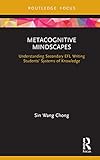Metacognitive mindscapes :
Material type: TextPublication details: Routledge 2021Description: 119 pages cmISBN:
TextPublication details: Routledge 2021Description: 119 pages cmISBN: - 9781138587519
- 155.5134 CHO
| Item type | Current library | Collection | Call number | Status | Date due | Barcode | |
|---|---|---|---|---|---|---|---|
 Books
Books
|
Mahindra University VNLRC General Stacks | Education | 155.5134 CHO (Browse shelf(Opens below)) | In transit from Mahindra University VNLRC to Mahindra University Indira Mahindra School of Education since 10/04/2023 | E0113 |
Browsing Mahindra University Indira Mahindra School of Education shelves, Shelving location: General Stacks, Collection: Education Close shelf browser (Hides shelf browser)
"Synthesizing research on metacognition and intersecting it with studies on second and foreign language writing, Sin Wang Chong puts forward a conceptual framework of metacognition and metacognitive knowledge that is employed as an analytical lens to examine junior secondary EFL students' writing proficiencies. The exploration takes into account three facets of metacognitive knowledge namely person knowledge, task knowledge, and strategic knowledge. Based on data garnered from interviews, open-ended questionnaire, and think-aloud sessions with students, the book analyzes the three types of metacognitive knowledge - theorized as a system - of junior secondary students with high, average, and low writing proficiencies. Discussion of the findings offers an expanded understanding of the factors that potentially affect students' writing proficiencies, which will inform the teaching of primary and secondary EFL writing teachers to be more learner-centered. The book will appeal to researchers and teachers interested in metacognition and metacognitive knowledge"--
There are no comments on this title.








